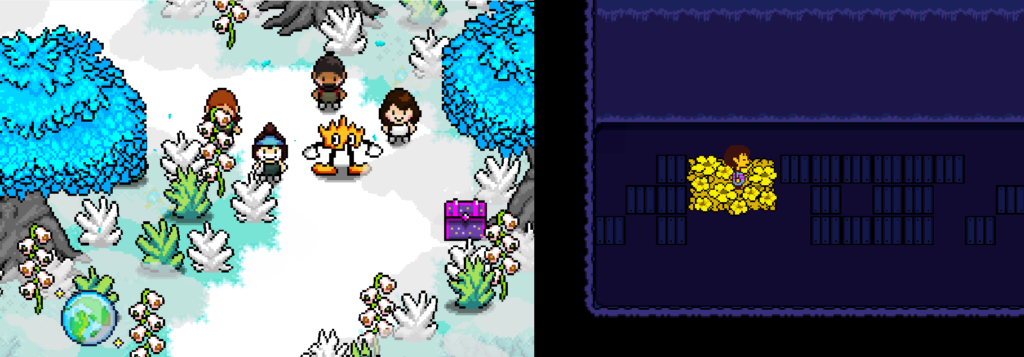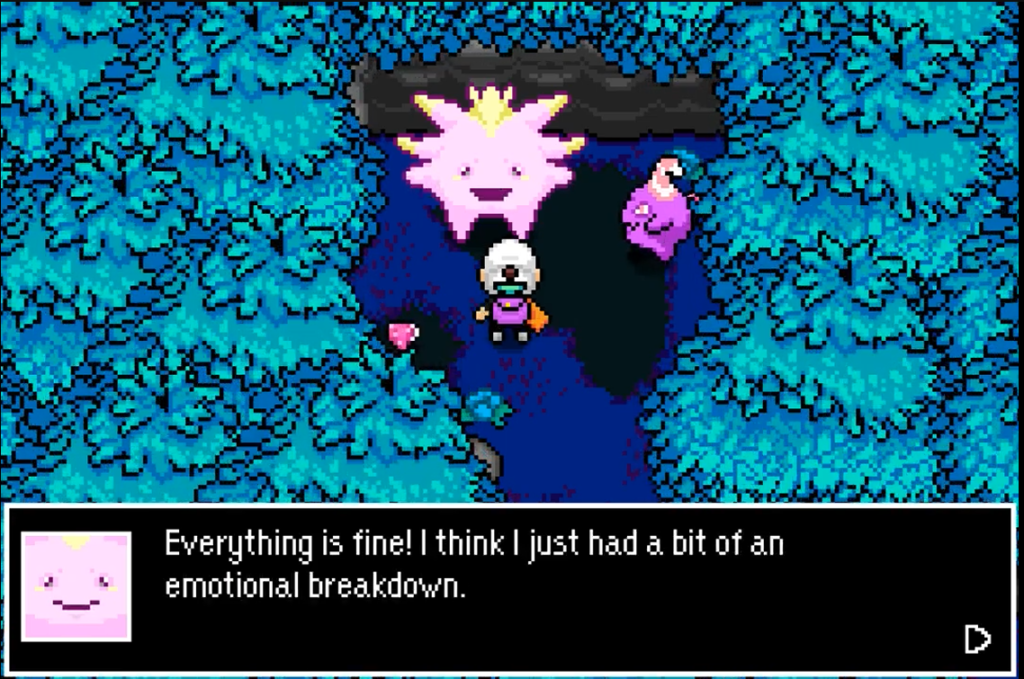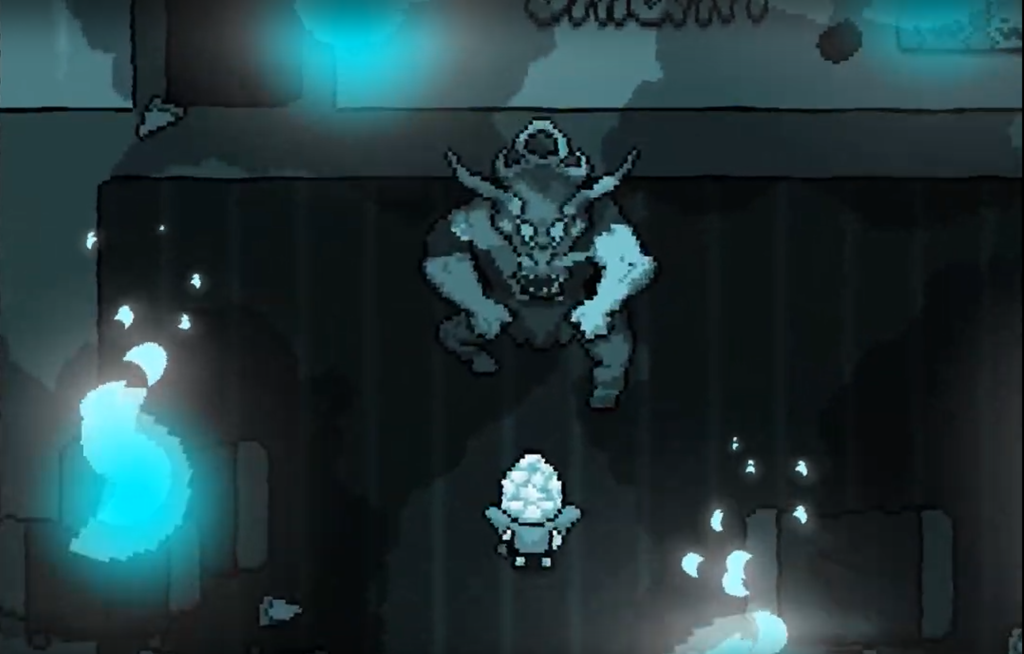Forward: This writeup contains spoilers, because any meaningful discussion about Athenian Rhapsody requires talking about narratives. If you just want a spoiler free, simplified take, here’s mine: Athenian Rhapsody is quite good, and in many places it is better than Undertale.
But in the areas that really defined Undertale as an experience for me, (narrative and characters) Athenian Rhapsody isn’t as strong.
If what you loved about Undertale was the gameplay, secrets, and boss fights, then play Athenian Rhapsody. But if what you loved was the narrative and story, I think Undertale is better.
Introduction
I think Athenian Rhapsody is a pretty excellent game. I originally wrote “good” instead of excellent, but that felt like damning with faint praise. There are a ton of games that Athenian Rhapsody is better than. On any scale, it’s an 8 out of 10.
Unfortunately, weighing in on the other end of the scale is Undertale.
Not every book review starts by comparing the book to Moby Dick. Not every fantasy movie gets measured against Star Wars. As such, it seems almost cruel to compare every funky RPG that I play to Undertale.
But… if you make a turn based RPG with an emphasis on bullet-hell style puzzles and options for avoiding conflict based on interacting with NPC’s, a generally comedic tone, and at YOUR CORE a choice between solving problems with words or violence… well. Games are compared to their peers.
And unfortunately for you, Athenian Rhapsody, your peer is what many would consider one of the greatest games of the last 10 years.
Where Athenian Rhapsody Surpasses Undertale
Undertale is 10 years old, and it hasn’t aged perfectly. I replayed Undertale for this writeup, to try to shake off the nostalgia, and there are many places where Undertale is noticeably plainer.

The landscape of Athenian Rhapsody is much more vibrant. Bright colored weeds, trees, and psychedelic clown houses are very present with the same pixel art style, but feel much more fully realized. Enemies and characters are also more complex in their design. The end result is a far more animated world.
Of course, art is a matter of taste. Combat really isn’t. While both games use the bullet-hell mini-game style, Athenian Rhapsody innovates with an additional set of Burst actions, small buffs and boosts that take mana to use. Bursts don’t use a primary action, so they can be used to heal yourself, boost your speed, or for other various effects. Athenian Rhapsody also has a party system, allowing you to bring a second character to fights, with alternate Burst options, and the ability to switch between.
The end result is that there’s more actual strategy in Athenian Rhapsody than there is in Undertale, and more things to do if you aren’t just murdering everyone. Even the purely pacifist fights are far more dynamic.
Note: I wish Athenian Rhapsody did have slightly more varied character movement options, though. As far as I can tell, the MC moves one way, and everyone else moves slightly worse.
And Where It Doesn’t
From here on out, expect spoilers for both Athenian Rhapsody and Undertale.
Trying to talk about the story and lore of either of these games is a two fifteen hour YouTube video essay. I don’t think I’m qualified to do that. I also don’t really want to do that.
Instead, I want to compare two characters within the story, and contrast their actions, and behaviors. Because I think doing so will provide a decent example of why I like Undertale better.
Those characters are Papyrus and Richard.
In terms of their role in the story, Papyrus and Richard are somewhat alike. They’re both fairly early game characters, who are defined by at least somewhat opposing the player. What really differentiates them though, is their characterization, and how it’s handled.
The Other Funny Skeleton Man

Papyrus is, frankly, a bit of a screwball. He’s goofy, and—while not-unthreatening—he doesn’t mean your harm. He does intend to capture you, and hand you over, but it’s clear that he’s doing it because he wants people to like him. All of this is demonstrated via his mostly useless puzzles, his attempts to distract you, and dialogue. At a critical moment, when it seems clear he’ll give you an impossible challenge, he chooses to back down.
Perhaps even more critically, losing to Papyrus in a fight, unlike ALMOST EVERY OTHER enemy in the game, doesn’t result in a game over. Instead it results in you being dragged back to his house. Papyrus wants to arrest you, not hurt you.
And then there’s Richard

Richard is a bully.
It’s tricky to say why he’s a bully, but by the time you meet him, he is very much the biggest kid on the playground. He tries to crush you with a piano. Richard cheats in every game he plays. He throws knives at people for fun, and it’s noted he’s done this to other people too. His affection for his friend James is legitimate, but toxic. He extorts people, and tosses those who don’t do what he wants into jail. By any definition, he’s a murderer.
He is an awful person.

Okay, that last one is a bit of a stretch, because I think it’s important to note that Richard is, by the standards of the world, not being unreasonable. He lives in a world where killing people makes you more powerful, and he doesn’t want to die. Much like Undertale, Athenian Rhapsody is a world that runs off RPG mechanics, and its residents know it.
And there’s nothing wrong with any of that! Richard isn’t unreasonable, or alien. He’s a scary bully, and the product of a damaging environment. But that’s not my problem with his character arc.

In a standard run, Richard will finally snap and attacks you. If you choose to fight back and kill him in self-defense, he finally relents, admitting that what he’s done is wrong, and he’s acting out of fear. He apologizes, acts embarrassed, and offers to be friends, and join your party.
But then he doesn’t change.
He doesn’t really do anything! He’s sorry for his actions, but he never, for example, lets the ENTIRE JAIL CELL of maybe a dozen people he’s locked up go. He acknowledges his bad behavior, but doesn’t even try to be someone different. There’s no real growth or immediate conclusion to his tale, and his arc sorta just ENDS directly after the fight.

I mentioned earlier that Papyrus and Richard occupy a similar place in the story, and part of that place is to build the game’s world in a “Show Don’t Tell” manner.
Papyrus is trying to capture a human so that the underground can be free, but when he’s actually confronted with a human that doesn’t react with violence, he can’t really find it in himself to do you in.
Richard is as much a victim of the system of EXP in Athenian Rhapsody as he is using it to harm others.
The problem is, at the point in time where Richard is given something that seems like it’s supposed to feel like a redemption, he isn’t redeemed. He just chooses to not act on his own worst impulses. By comparison, Papyrus somewhat actively choose to try to be friends with you, even if he’s very bad at it.
And this is a recurring problem I have with the writing of Athenian Rhapsody. The characters’ stories either feel incomplete, or somewhat illogical. It’s hard to tell if the game wants to be funny, or heartfelt. And by trying to do both, it cheapens itself.
Horatio is another perfect example. Like Richard, he’s a bully, and his whole arc revolves around being upset about his wife breaking up with him. Except, surprise surprise, she didn’t break up with him, she just went to the store! What a funny wacky twist.

A twist which we witness after Horatio attacks multiple people, destroys an entire restaurant, and again, tries to kill you. What a wacky, funny guy. Then he just tells his wife she sucks and joins your party.
Incredible characterization.
Not all of Athenian Rhapsody’s characters are like this, but many of them fail to feel fleshed out, or at least feel at odds with each other. Nylon is clearly intended to show how awful the world is. They tell you about how EXP Hunters killed their kid, and you fight them in a room of children’s toys.
Whereas Aerosol is just… kind of there. Same for Girlcat.
The experience is a weird tonal whiplash. I can both care about a fictional world, and laugh at fart jokes, but it’s hard to do both at once. Undertale managed to pull that off.
Athenian Rhapsody didn’t.
Conclusion
Now, I do want to give some praise to Athenian Rhapsody’s writing. There are a lot of other games that have tried to do the whole “modern subversive RPG” thing (like Knuckle Sandwich) that fail badly because they don’t have a coherent story. Athenian Rhapsody keeps its core premise in mind for almost all interactions and characters, instead of turning into a series of unrelated side stories.
Athenian Rhapsody (generally) keeps its rules for worldbuilding consistent and meaningful to its narrative, instead of shoving them away, or making up new ones. But it never quite does enough with many of the side stories, or at least as much as I had hoped.
I don’t think my argument for why I find Undertale to have superior writing to Athenian Rhapsody is perfect, but I do feel like I gave Athenian Rhapsody a fair shot. I played through the whole thing 2.5 times. And I replayed Undertale to try to wash out 10 years of nostalgia and fan vision.
And this is still my take on it. Undertale is just better written. Including the big things, like character arcs, and the small things, like every interactable item, or mini-quest, or tiny bit. Athenian Rhapsody leans a bit too much into the “Lol So Random” at times, and I think that’s to the game’s detriment.


